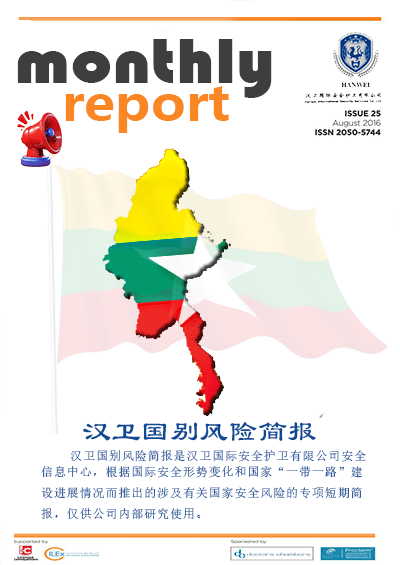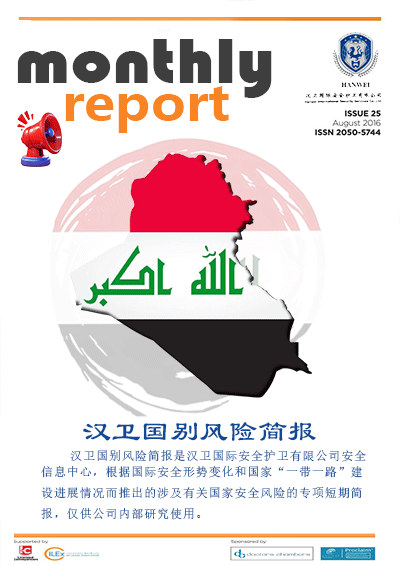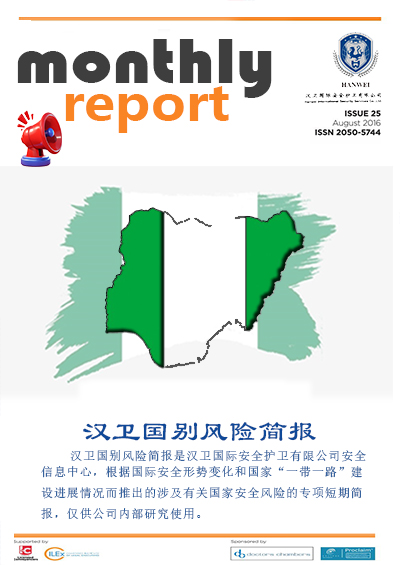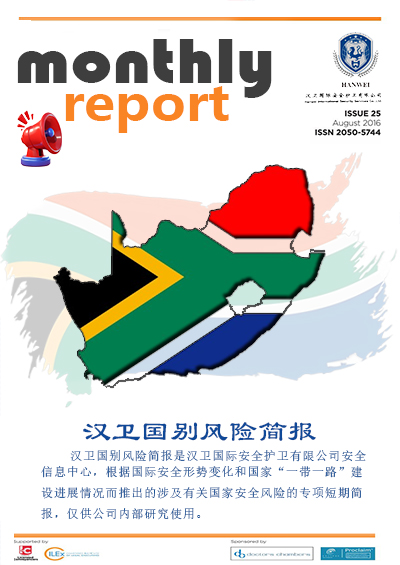Summary of Nigeria's Security Situation in September 2025
Researcher No. 007
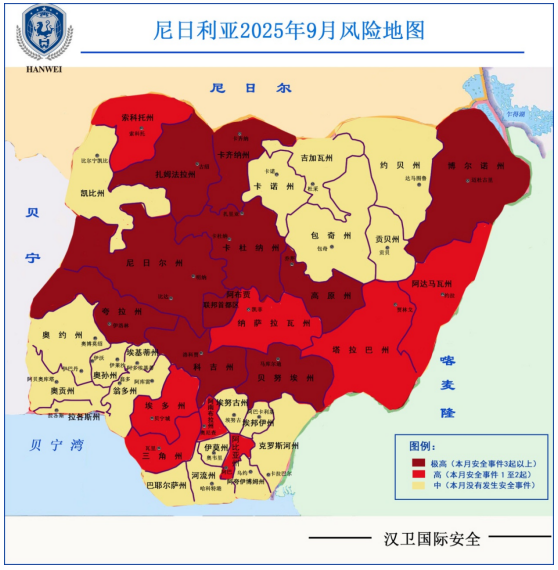
Based on monitoring reports from Hanwei International's security officers stationed in West Africa and comprehensive media coverage, a total of 74 security incidents were recorded in Nigeria in September 2025. These incidents resulted in the deaths of 286 civilians and 56 military/police personnel, with at least 183 people abducted. The main types of security incidents included armed attacks and abductions, military clearance operations, and public safety accidents.
Compared with the previous month, the number of security incidents increased by 13, the death toll rose by 100, and the number of abductions decreased by 147. Analysis indicates that Nigeria's security situation further deteriorated this month: armed attacks in Benue State (central Nigeria) and Plateau State (central Nigeria) rebounded significantly; large-scale armed attacks and abductions occurred frequently in Zamfara State (north-central Nigeria), Borno State (northeastern Nigeria), and other regions. Meanwhile, floods, epidemics, and other hazards remained prevalent, causing massive casualties and property losses. In addition, incidents of attacks on convoys of Chinese-funded enterprises and abductions of Chinese citizens occurred again this month, posing a severe threat to the safety of Chinese enterprises and personnel stationed in Nigeria.
In September, the security risk in central, north-central, and northeastern Nigeria was extremely high, while other regions faced medium-to-high risk.
I. Comprehensive Analysis of Security Incidents
The 74 security incidents in Nigeria in September comprised the following categories:
These incidents resulted in 431 deaths (including 286 civilians, 56 military/police personnel, and 89 neutralized terrorists) and at least 183 abductions. The overall security situation exhibits the following characteristics:
(1) Extremely High Security Risk in Central, North-Central, and Northeastern Nigeria
In September, security incidents in Nigeria were mainly concentrated in Zamfara State (north-central), Benue State (central), and Plateau State (central). Meanwhile, Borno State (northeastern), Kaduna State (north-central), Kwara State (north-central), and Niger State (north-central) were also high-risk areas.
Zamfara State (north-central) had the highest security risk, with 9 security incidents (roughly the same as the previous month), primarily armed attacks and abductions. These incidents caused 10 deaths and 51 abductions.
Plateau State and Benue State (central) each recorded 6 security incidents, mainly armed attacks, resulting in 30 deaths and 4 abductions combined.
Additionally, Borno State (northeastern Nigeria) faced a severe security situation this month, with multiple large-scale armed attacks. A single attack on September 6 alone killed 64 people. Nigerian authorities stated that the attack was carried out by the "Boko Haram" armed group. This organization has long competed for territory with the "Islamic State West Africa Province (ISWAP)" in the region, attempting to control northeastern Nigeria through violent means.
According to the latest data from the non-profit organization "Good Governance Africa," nearly 300 armed attacks occurred in northeastern Nigeria in the first half of 2025, killing approximately 500 civilians and leading to the capture of at least 17 Nigerian military bases. Currently, northeastern Nigeria has become one of the most volatile regions in Africa. United Nations statistics show that armed conflicts in the region over the past decade have killed at least 40,000 people and displaced more than 2 million, creating a large-scale humanitarian crisis.
Security Warnings
According to mid-to-late September monitoring reports from Hanwei International's security officers stationed in West Africa:
Bandit groups plan to abduct foreign citizens in the border area between Kogi State and Kwara State. They are preparing to attack foreign-funded companies along the route of Kogi State and Kwara State using a Hilux pickup truck painted in military vehicle style (equipped with a heavy machine gun).
Armed groups also plan to launch attacks on Borgu, Mokwa, and Kontagora Local Government Areas of Niger State.
All Chinese-funded enterprises and citizens in these areas are requested to:
Reduce outdoor activities
Strengthen security precautions
Evacuate personnel engaged in field operations to safe urban areas or leave the aforementioned states
Figure 1: Distribution of Security Incidents in September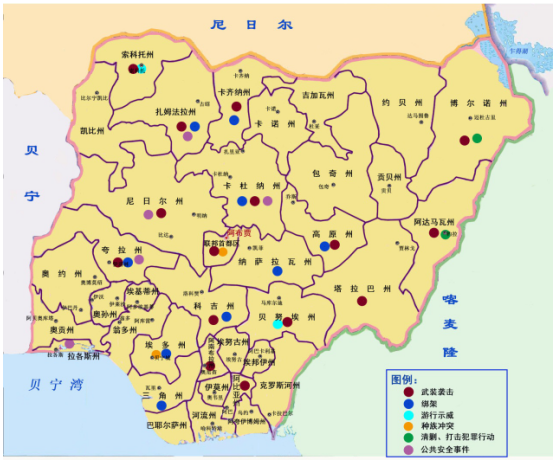
Chart 1: Statistics of Security Incidents in Major Regions in September
(II) Persistent High Frequency of Armed Attacks and Abductions
In September, Nigeria recorded a total of 54 armed attacks and abduction incidents, resulting in 188 deaths and at least 183 abductions. Compared with the previous month, the number of such incidents increased by 11, while the death toll decreased by 54 and the number of abductions dropped by 147. Notable attacks and abductions with over 10 casualties or abductions are as follows:
On September 1, armed bandits attacked a village in the Sabuwa Local Government Area of Katsina State, killing 4 villagers and abducting at least 79 people.
In the late night of September 5, armed bandits raided Magajin Wando Village in the Dandume Local Government Area of Katsina State, resulting in 7 villagers dead and 3 abducted.
On the evening of September 6, the border town of Darul Jannah—located in northeastern Nigeria, adjacent to Cameroon—was attacked by extremist militants, killing 63 people, including 5 soldiers.
On September 7, Kaduna State was hit by coordinated attacks by armed bandits, causing 8 deaths, 18 injuries, and several abductions.
On September 12, a funeral in Ezi Village, Ogidi Town, Idemili North Local Government Area of Anambra State was attacked, leaving at least 4 dead and approximately 15 injured.
On September 15, a mosque in Gidan Turbe Village, Tsafe Local Government Area of Zamfara State, Nigeria, was assaulted, with 43 civilians abducted.
On the morning of September 19, suspected Fulani armed herders attacked a joint security patrol team in the Agu Community of Katsina-Ala Local Government Area, Benue State, killing 11 team members.
In the early morning of September 28, armed bandits attacked Ogba-Ayo Village in the Oke-Ode Community of Ifelodun Local Government Area, Kwara State, killing at least 10 community security officers and abducting 5 people.
Recently, Nigeria’s mining areas have emerged as key targets for attacks. On September 7, a tin mine in the Wang Community of Bokkos Local Government Area, Plateau State (central Nigeria), was attacked by suspected Fulani militia in the evening, resulting in 7 miners dead and 3 severely injured. Media analysis suggests that militants often target mining areas under the pretext of "cracking down on illegal mining" to plunder resources and reap exorbitant profits. According to the latest report from the United Nations High Commissioner for Refugees (UNHCR), since April 2024, a total of 217 mining-related violent incidents have occurred in north-central Nigeria, killing over 1,500 people and forcing approximately 380,000 miners to flee their homes—forming Africa’s largest "mining refugee crisis".
In September, armed abductions in Nigeria increased by 8 cases. Analysis indicates that the primary motive of militants behind these abductions remains the extortion of high ransoms. Statistics show that between 2024 and June 2025 (a 1.5-year period), the total ransom paid for abductions in Nigeria reached 2.56 billion Naira (equivalent to approximately 12 million RMB). The "abduction ransom economy" has evolved into a "high-profit industry" in impoverished rural areas.
Given the instability of Nigeria’s security situation, the Chinese Consulate General in Lagos issued another security alert on September 14. It required Chinese-funded enterprises and Chinese citizens in Nigeria to eliminate complacency and fluke mentality, firmly establish a "bottom-line thinking", and strengthen security awareness. For high-risk outdoor operations, enterprises must enhance security measures and emergency response plans, prohibit nighttime operations, and ensure the safety of employees and property. Personnel traveling to high-risk areas should conduct advance risk assessments, strengthen travel security measures, avoid disclosing their itineraries in advance, alternate between multiple routes to prevent lawbreakers from identifying travel patterns, and refrain from traveling at night or alone. They are also advised not to visit remote areas with poor public security and to strengthen self-protection. Additionally, the U.S. Mission to Nigeria issued a security alert in early September, warning its citizens to avoid visiting Nigerian military and government facilities, particularly areas in the capital Abuja.
(III) Multiple China-Related Incidents
In September, three China-related incidents occurred in Nigeria:
Attack on a Chinese Enterprise Convoy, Resulting in the Abduction of One Chinese CitizenAt approximately 10:30 p.m. on September 5, a convoy carrying 5 Chinese citizens was ambushed in Edo State. The attack left 8 members of the Nigerian Security and Civil Defence Corps (NSCDC) and one driver dead, with 1 Chinese citizen abducted. Following the incident, the Nigerian Security and Civil Defence Corps immediately formed a joint force—comprising counter-terrorism units, Special Weapons and Tactics (SWAT) teams, special police units, and special protection units—to search the forests in the area and rescue the abducted Chinese citizen. Currently, the abducted Chinese citizen’s whereabouts remain unknown, while the other 4 Chinese citizens are safe. This marks the 6th attack targeting Chinese citizens in Nigeria this year, with a cumulative total of 3 deaths and 4 abductions.
Seizure of Five Chinese EnterprisesOn September 19, media reports stated that the government of Ogun State, Nigeria, recently announced the seizure of five Chinese enterprises and the arrest of some of their relevant responsible persons. The Special Adviser on Environmental Affairs to the Governor of Ogun State noted that the five seized Chinese enterprises are all located on the Ogre section of the Lagos-Ibadan Expressway and have long been involved in environmental violations. These violations include improper disposal of industrial waste, burning of garbage that pollutes the environment, and refusal to cooperate with government-approved professional waste collection agencies—all of which have caused adverse impacts on the local ecological environment. Currently, post-seizure disposal of the five involved enterprises and judicial accountability for relevant personnel are ongoing.
Attack on a Chinese-Funded Mining AreaOn September 23, a Chinese-funded mining enterprise in Kwara State was attacked by bandits, resulting in the death of one on-duty police officer and the abduction of two security personnel. No Chinese citizens were reported injured or killed.
(IV) Public Safety Incidents Causing Heavy Casualties
According to incomplete statistics, Nigeria recorded 2 major traffic accidents, 1 shipwreck, 2 explosions, 1 building collapse, and 1 coal mine accident in September, leading to a total of 154 deaths. Meanwhile, floods in Nigeria remained severe in September, with 11 states—including Adamawa, Nasarawa, Taraba, Delta, Niger, Sokoto, and Zamfara—issuing flood warnings on multiple occasions. According to statistics from the National Emergency Management Agency (NEMA) of Nigeria on September 23, the current round of floods in Nigeria has caused 232 deaths, 681 injuries, approximately 120,000 displacements, and affected 339,000 people. The floods also damaged 42,000 houses and destroyed 48,000 hectares of farmland. Among the affected states, Niger State had the highest death toll, with 163 fatalities. In addition, Adamawa, Kaduna, Nasarawa, Bauchi, and Jigawa states also suffered severe losses.
In September, the Lassa fever epidemic in Nigeria remained highly prevalent. According to the latest report from the Nigeria Centre for Disease Control and Prevention (NCDC), as of September 21, 7,792 suspected cases, 906 confirmed cases, and 168 deaths from Lassa fever had been reported across 106 local government areas in 21 states of Nigeria, with a Case Fatality Rate (CFR) of 18.5%—higher than the 16.9% recorded in the same period in 2024. Compared with the previous month, suspected cases increased by 759, confirmed cases by 52, and deaths by 9. Currently, most confirmed cases are concentrated in Ondo, Bauchi, Edo, Taraba, and Ebonyi states.
Furthermore, Zamfara State is grappling with a severe cholera epidemic. Since the outbreak on January 15, 11,000 cases have been recorded, with a CFR of 1.6%. Over 60% of these cases occurred in the Talata Mafara, Gusau, Bungudu, and Zurmi Local Government Areas of the state. The U.S. Centers for Disease Control and Prevention (US-CDC) and the African Field Epidemiology Network (AFENET) have dispatched a rapid response team to Zamfara State to assist in containing the cholera epidemic.
(V) Ongoing Military Clearance Operations
In September, Nigeria’s security forces and police continued to conduct military clearance operations in north-central and northeastern Nigeria, neutralizing 89 militants and rescuing 50 abducted people.
On September 10, the Nigerian Army stated that during nationwide operations over the previous two days, it had arrested 11 terrorist logistics suppliers, rescued 9 abducted people, and seized 114 livestock, 1.1 million Naira in cash, and some weapons and ammunition.
On September 20, the Nigerian Air Force conducted a coordinated nighttime airstrike in Borno State, killing 25 terrorists.
On September 25, the Nigerian Defence Headquarters announced that during nationwide operations carried out from September 14 to 22, it had arrested over 120 criminals and rescued 41 abducted people. The operations covered all war zones in the northeast, northwest, north-central, south-south, and southeast regions.
Chart 2: Classification Comparison of Security Incidents in September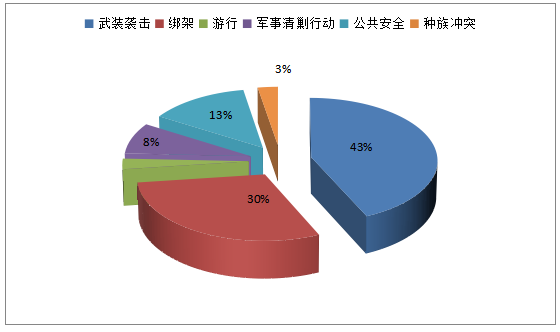
Chart 3: Statistical Classification of Deaths in September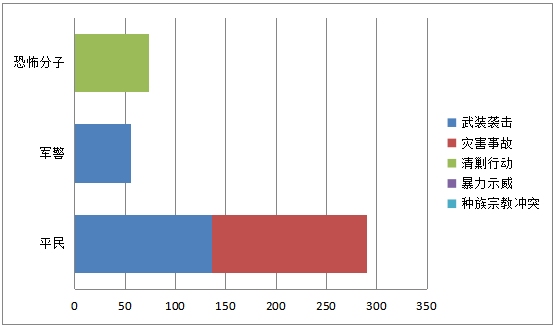
Chart 4: Comparison of the Number of Major Security Incidents Between September and August 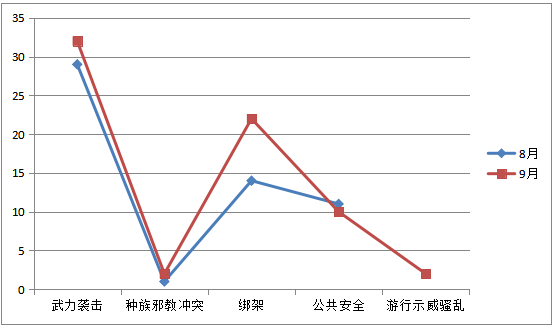
II. Risk Early Warning and Prevention Suggestions
Chart 5: Recent Early Warning of Nigeria's Social Security Risks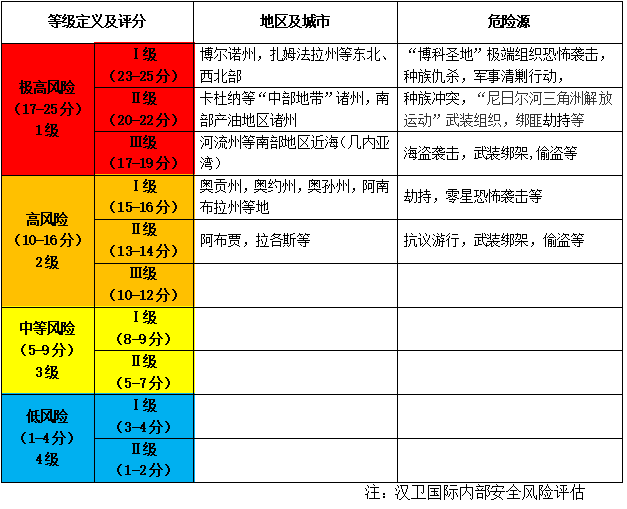
In view of Nigeria's complex social environment and high-risk security assessment, the following security measures are recommended:
1. Implement Round-the-Clock Security for Travel
In remote rural areas of Nigeria, police resources are limited, road infrastructure is poor, and security forces often respond with significant delays to violent crimes and riot-related conflicts. Therefore, Chinese-funded enterprises and related parties must:
Obtain the latest local security intelligence in a timely manner and conduct specific security assessments of travel destinations.
Arrange for security personnel to accompany all travel activities to ensure protection throughout the journey.
2. Prioritize Flood Prevention During the Rainy Season
Nigeria remains in a high-risk period for floods this month, with flood warnings issued in multiple regions. To date, floods in Nigeria have caused 232 deaths and 681 injuries. In this regard, Chinese enterprises and personnel stationed in Nigeria are reminded to:
Monitor flood situation updates closely and check early warning information released by local governments and meteorological departments in a timely manner.Avoid traveling to high-risk flood-prone areas.
Complete emergency preparedness measures, exercise caution during travel, and improve emergency communication mechanisms. In case of emergencies, contact the Chinese Embassy or local rescue authorities immediately.
3. Effectively Mitigate Security Risks
(1) High-Risk Area Avoidance
Most attacks in Nigeria occur in the northeastern and north-central regions, particularly:Central Maiduguri in Borno State, as well as roads connecting Maiduguri to other major towns;Areas bordering Niger;Zamfara State;Kaduna State and Abuja (where security incidents have been frequent recently).In the event of a terrorist attack, strictly follow official instructions, contact designated security service providers promptly, and secure assistance without delay.
(2) Strengthen Perimeter Security for Premises
Install video surveillance systems at residences, business premises, warehouses, and living quarters.Equip camps with security facilities such as trenches, high walls, barbed wire, anti-ramming barriers, buffer zones, and alarm systems.Reinforce security forces with military and police personnel and expand the scope of defense.
(3) Minimize Stay in High-Risk Locations
Avoid lingering near sites that may be targets of armed attacks, including government and security force facilities, landmarks, and religious venues. Specifically in Nigeria, minimize time spent in the following crowded public areas:Northeastern Nigeria;Religious festival venues and ethnically mixed areas;High-crime zones (especially highways and piracy-prone waters in the Gulf of Guinea);Oil and gas facilities, government buildings, and military barracks;Foreign embassies, religious places of worship, schools, markets, refugee camps, and public transportation hubs.

